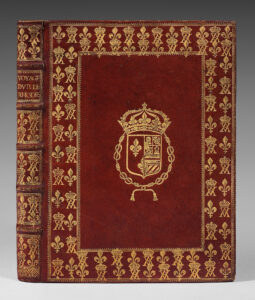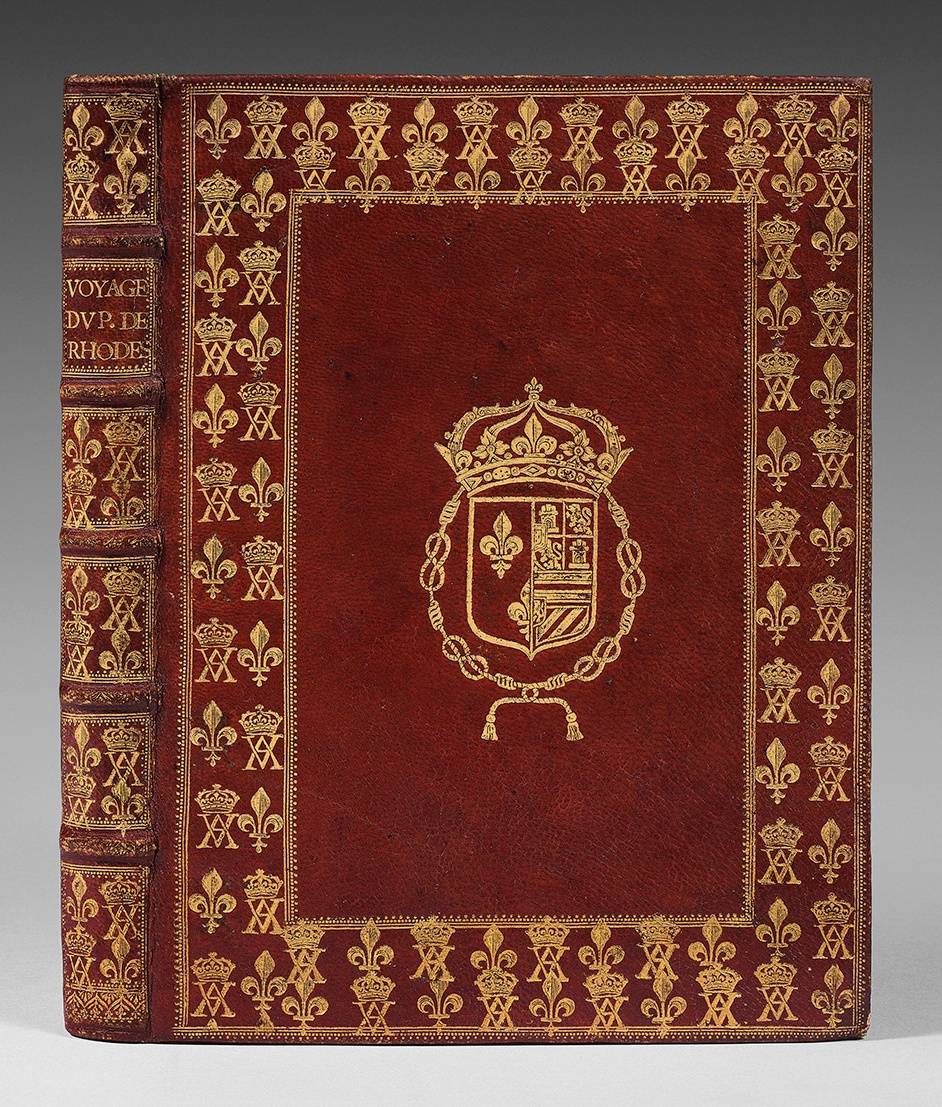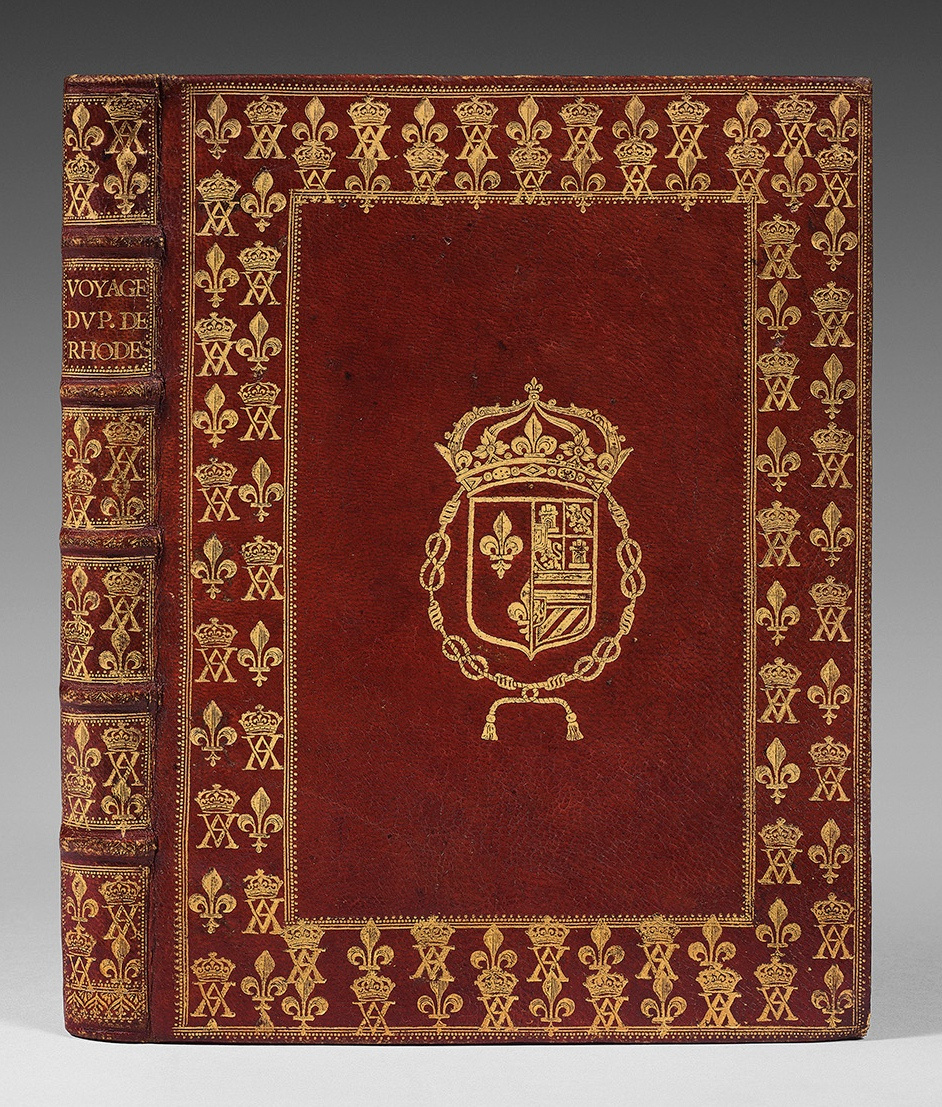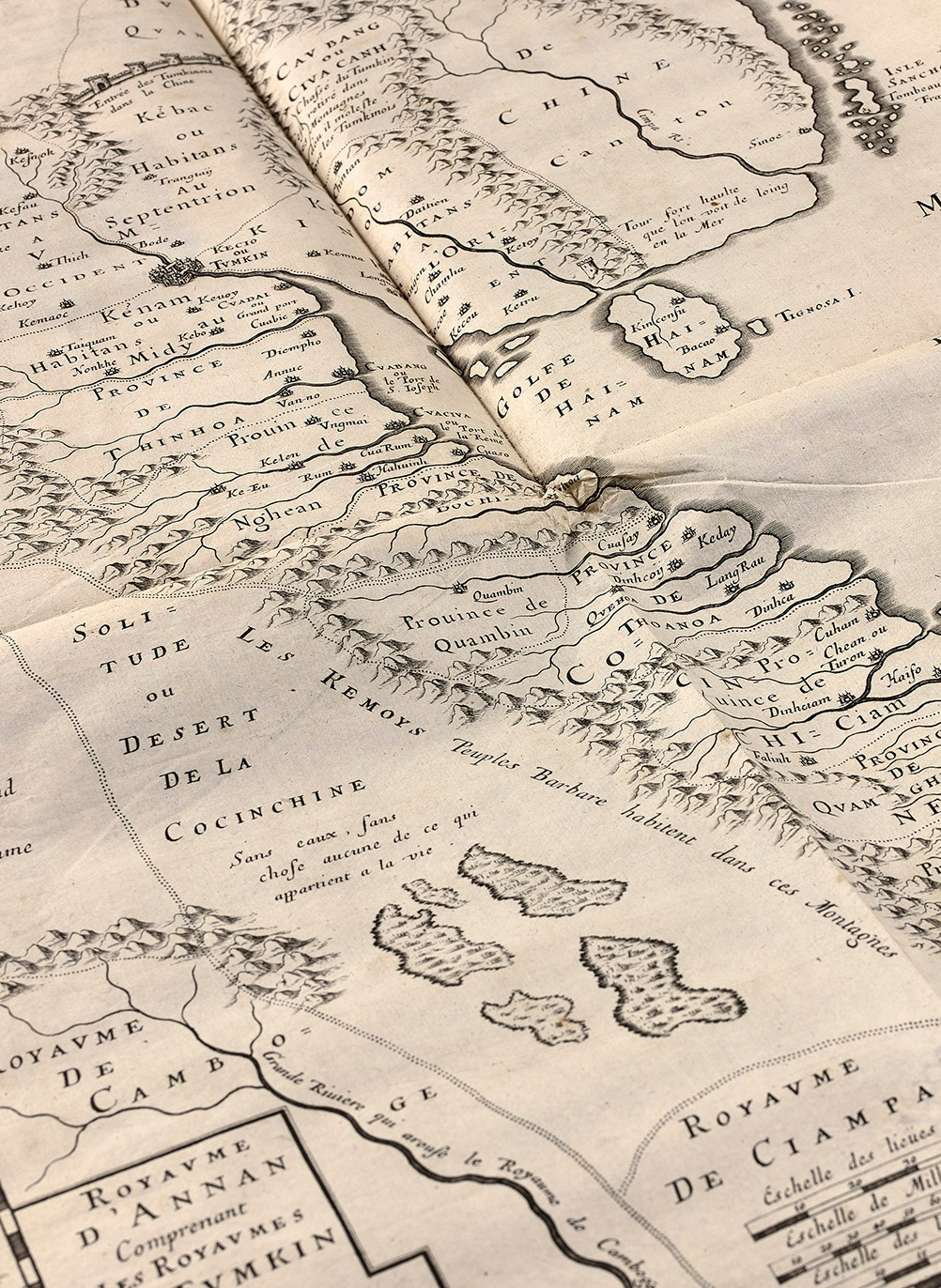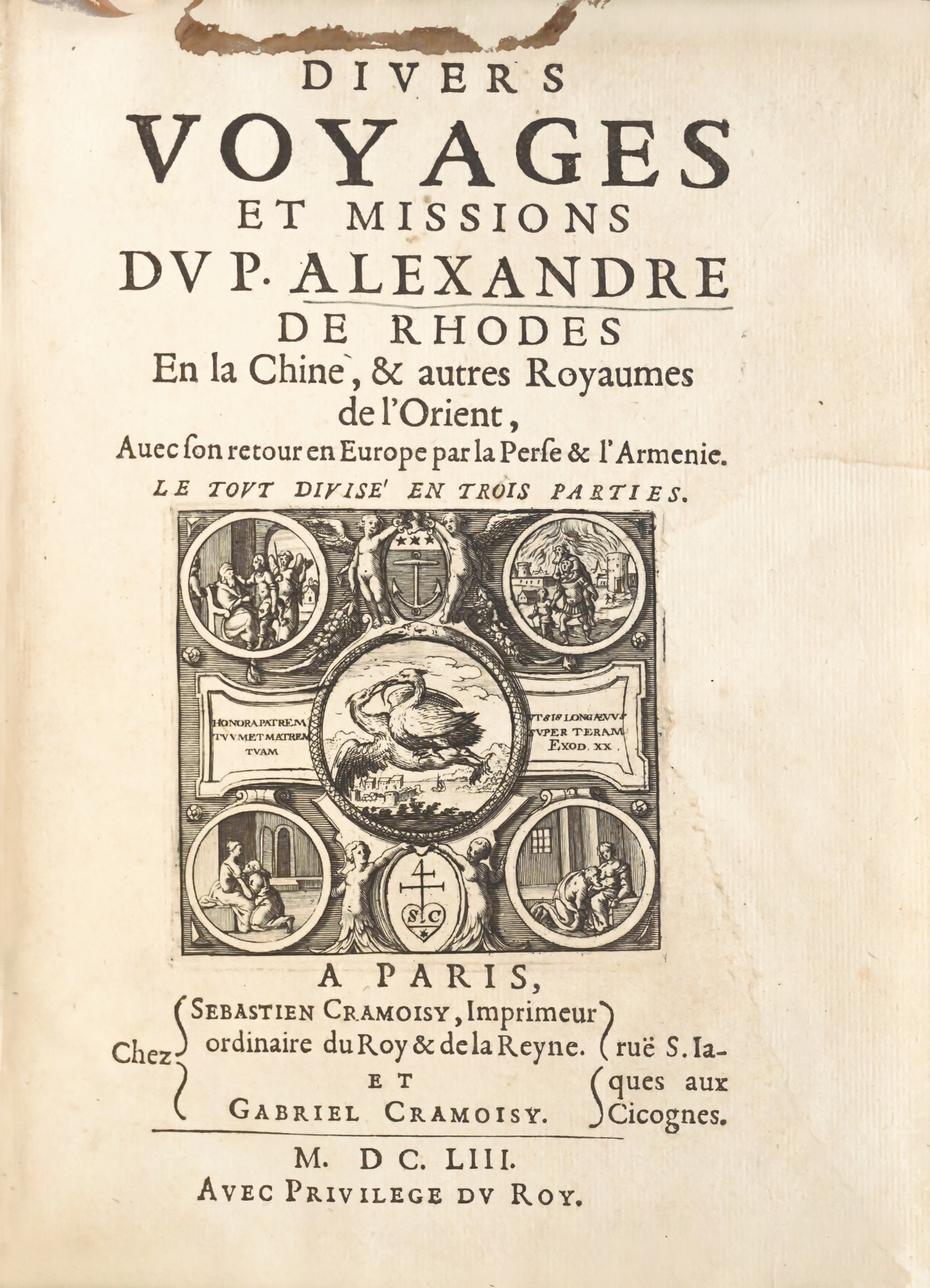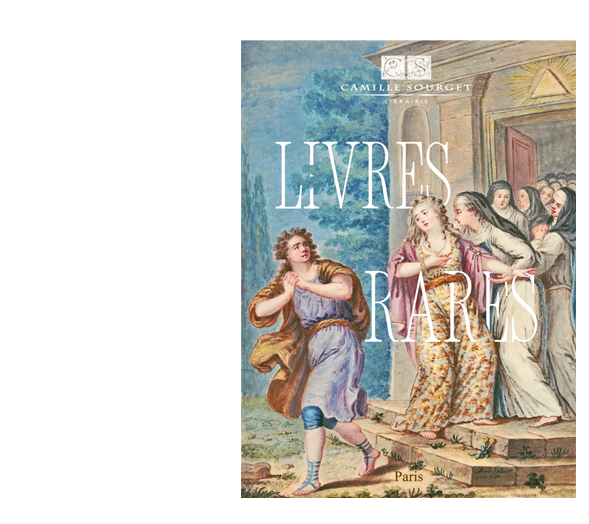Paris, Sébastien et Gabriel Cramoisy, 1653.
4to [233 x 173 mm] of (2) bl.ll., (12) ll., 276 pp., 82 pp., 1 large folding map of the Kingdom of Annam.
Red morocco, large border decorated with a seme comprising fleurs-de-lis and crowned cyphers, coats of arms in the center, ribbed spine with the same decorations, inner gilt border, renewed doublures and endpapers, title reinforced without loss of text, gilt edges. Decorated contemporary morocco binding with arms.
Precious dedication copy which was offered to Queen Anne of Austria of this extremely rare first edition of Alexander of Rhodes’ journeys to the Far East.
Cordier, Sinica, col 2080.
It is illustrated with a folding map of the Kingdom of Annam, with Tonkin and Cochinchina. This account includes Goa, the island of Salsedes, Malacca, Macao, Cochinchina, Tonkin, the Kingdom of Macassar, Persia and Armenia.
Alexander of Rhodes dedicates himself to the evangelization of Japan and leaves Rome in October 1618 for Lisbon, which was the main European port of embarkation for the East Indies. He learns Portuguese while waiting for departure on April 4, 1619, on the “Sainte Thérèse”, to Goa. Among the four hundred passengers of this ship are other Jesuit missionaries such as Jerome Majorica, evangelizer of “Tonkin” and “Cochinchina” and prolific author of Christian texts in chù nôm.
The ship passes the Cape of Good Hope on July 20, 1619 and reaches the island of Goa on October 9 of the same year. Alexander of Rhodes is greeted by the Jesuits who had settled in Goa since Francis Xavier’s arrival in 1542. He will stay for two and a half years in Goa and Salsette where he falls seriously ill. There he meets the French Jesuit Étienne de la Croix with whom he learns the local language Kanara or Canarin. On April 12, 1622, he resumes the course of his journey to Japan. He then embarks for Malacca where he arrives on July 28, 1622 and must wait nearly 9 months before setting sail again. Due to the growing persecution of Christians in Japan and the gradual closure of the country which began as early as 1612, his superiors decide to send him to another destination: the center of Vietnam where Fathers Francesco Buzomi (1576-1639) and Diego Carvalho had established a mission since 1615.
After 18 months spent between Macao and Canton, Alexander of Rhodes embarks with five other Jesuits to join Faifo, now Hôi An, one of the main ports of what he calls Cochinchina. It is a large economic center that trades with the Japanese and the Portuguese. He arrives there in March 1626, and in a few months he has sufficient knowledge of the Vietnamese language to preach in it. On March 12, 1627, along with the Jesuit Pedro Marques, Alexander of Rhodes embarks for Tonkin. He is sent by his superiors to assist the Italian Jesuit Giuliano Baldinottiqui who has great difficulty in mastering Vietnamese. The first church in Tonkin is built near Thanh Hóa. Nevertheless, the preaching is soon compromised by the conflict that breaks out, motivated by the opposition of the missionaries to polygamy and exacerbated by rumors of espionage propagated by the mandarins at the service of the king. Placed under house arrest in Hanoi in January 1630, Alexander of Rhodes was banished in May by the emperor Trjnh Trâng, under the pressure of his concubines. Unable to return to Cochinchina, all the more unfavorable to Christian clerics as they imagine they became spies of Tonkin, Alexander of Rhodes returns to Macao where he will teach moral theology for nearly 10 years.
Between 1640 and 1645, Alexander of Rhodes undertook four trips to Cochinchina as mission senior (January-September 1640, December 1640-July 1641, January 1642-September 1643, January 1644-July 1645). Most of the time, he will have to work in hiding, because of the hostility of the local authorities. Expelled from Cochinchina on July 3, 1645, he arrives in Macao 20 days later. In order to obtain more support from the Holy See, Alexander of Rhodes is asked to go to Rome to plead the cause of the Asian Missions.
After leaving Macao on December 20, 1645, accompanied by a young Chinese Christian, he will reach Rome only on the June 27, 1649, after many vicissitudes. Once in Rome, he exposes the situation of the Church in Cochinchina and Tonkin and seeks the support of the Vatican for the establishment of missions to the Propaganda Fide (Propaganda of the Faith). He pleads for the formation of an indigenous clergy and calls for the appointment of a bishop in partibus for Cochinchina and Tonkin, thus opposing the political and religious domination of Portuguese patronage, the padroado.
He leaves Rome on September 11, 1652, tasked by the Propaganda with finding the people and the funds necessary to fulfill his mission. He arrives in Paris in January 1653. There, he meets Father Jean Bagot, a Jesuit well introduced into the circles of power who had been confessor of the young Louis XIV. It is among the disciples of Father Bagot that he finds volunteers to go to Tonkin and Cochinchina, notably François Pallu who will be one of the three apostolic vicars appointed in 1658 by the pope for the Asian missions, founding act of the Foreign Missions of Paris (MEP).
On the other hand, the Company of the Blessed Sacrament, supported by Anne of Austria, Saint Vincent de Paul and Bossuet, gives the necessary financing for Alexander of Rhodes’ project. But this project was likely to aggravate the relations between the pope, the King of Portugal and the Society of Jesus. Disgraced, he is sent to Persia in November 1654 where he immediately learns the language. This is where he dies in November 1660.
The halts, in Alexander of Rhodes’ itinerary, are therefore opportunities to learn languages. Alexander of Rhodes knew 12 to 13 languages: French and Provençal, his mother tongues, Latin, Greek, Italian and Hebrew, Portuguese, Spanish, Canarin, Chinese, Japanese, Persian and Vietnamese, languages ”which he could almost all speak fluently” (Cadière 1915: 239).
Precious dedication copy magnificently bound with the arms and monograms of the Queen Anne of Austria, surrounded by the widow drawstring, louis xiii having died in 1643. Anne of Austria, through the Company of the Blessed Sacrament, partly financed alexander of Rhodes’ journeys to the Far East.
Anne of Austria, eldest daughter of Philip III, King of Spain, and Margaret of Austria, born September 22, 1601, married Louis XIII, King of France, on November 25, 1615, in Bordeaux. Widowed on May 14, 1643, she was declared regent by the Parliament on May 18 and ruled during the minority of Louis XIV with the help of Mazarin. She died at the Louvre on January 20, 1666, having had two sons, Louis XIV and Philippe II, Duke of Orleans. She had founded the monastery and built the church of Val-de-Grace where her heart was brought after her death. She gave numerous gifts to the regular and secular clergy.
From the library of the Château de Menneval with ex-libris.
